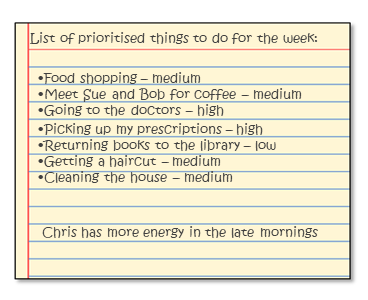When you are caring for a patient who has limited energy, it is important to try and prioritise. Prioritising means deciding which jobs are most important and getting them done first. To help with this:
- Try writing down together, a list of everything you and the patient need to do in the next week. You’ll need to work around appointments and events that can’t be changed.
- Then decide together which are ‘high’, ‘medium’ and ‘low’ priority.
Have you tried...?
It can help to ask yourselves these questions
- Is this activity essential?
- Can it wait?
- Could someone else do it instead?
- Does it energize the patient? Does it revitalize them, or does it drain their energy away? E.g. seeing friends, watching a favourite film, or doing a hobby the patient enjoys
Ideas for how to decide which priority to give different activities:
Something like going to the doctors is high priority as it is essential to the patient’s health – it shouldn’t wait, it couldn’t be done by someone else and is energizing.
Returning books to the library would be low priority as it is not essential – it can wait, someone else could do it instead, and it doesn’t really energize the patient.
- Try to prioritise activities which are energizing and put those that are energy-draining lower down the list
- Try to think about times when the patient tends to have more energy and plan high priority activities for those times
- You may not get around to doing the low priority tasks, or it may be someone else does them for you instead. That is just fine because people do like to help. Give yourself permission to accept help from others.
- Once you have prioritised tasks, and agreed when the patient is most likely to be able to do them, you can start planning tasks for specific days

Would you like to look at another support topic?
Page last reviewed: 08/05/2020


